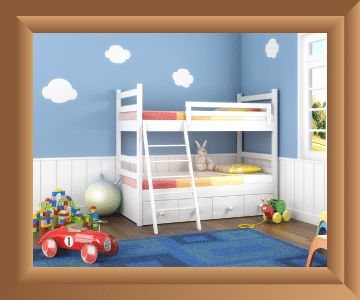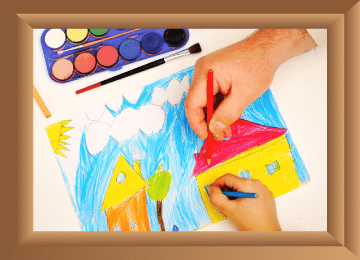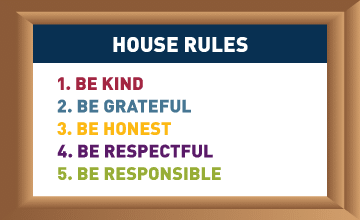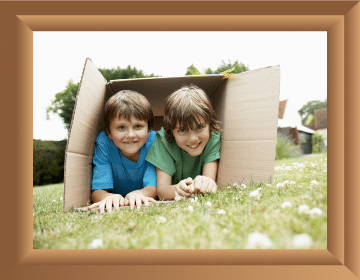settling in

4. Settling Into Your New Family Home
You’ve made it! Now it’s time for you and your family to get to know your new home. You should always look around your new home first before letting the kids loose. Walk around and check the utilities and look around to see if there is anything that needs repair or your special attention. It is essential to remove or identify any dangerous situations to your children or pets and get child proofing straight away.
Tackle Your Children's Bedrooms First
It is a good idea to tackle your child’s bedroom first so theyhave a safe haven full of comforts to retreat to. Sorting out your child’s room and filling it withfamiliar and comforting things can start to help them feel more secure when surrounded by unfamiliarity. If your child is older, you may want to get them involved in unpacking their things and let them help decide where things could go.

“We made sure that the first things we had ready at the new house were our daughter’s cot and a few familiar toys ready for her arrival - I can still remember the look of confusion, yet happiness when she arrived at the new house and saw her bedroom for the first time.”Emma Button (mellowmummy.co.uk)

“Make a plan of organisation when you enter the new home. Mine was - 1.Prepare beds for the kids so they are ready, 2. Prepare our bed. 3. Sort essentials in kitchen 4. Make sure TV is working to keep the kids amused in case of bad weather.”Marianne Whooley (marisworld.co.uk)


Make it Feel Like Home
Just as you said goodbye to your old home it is time to say hello to your new one. Once you have arrived and carried out your safety checks in your new home, take your children and introduce them to each room, explaining to them what they are. If you normally hang your children’s art work up, make sure you take them with you and put them up instantly to show your younger children that this can be home too. To reinforce a sense of family belonging, try and get the whole family involved and interested in helping to arrange or decorate your new home.
Introduce Your Pets to the New Space
Cats and dogs can feel incredibly anxious in unfamiliar surroundings so make sure you keep an eye on your pets during this time. Always make sure your pet has access to their food and water and that when they arrive at your new home they are left to settle in a quiet and safe place. It is a good idea to keep your cat or dog indoors for a while to let them adjust to their new home and be wary of confused pets making a dash for it and getting lost.


Maintain Normality and Traditions
While a little chaos is to be expected, re-establishing your families’ normal daily routines is really important in making the whole family feel more settled in your new home. Ensure you stick to your families’ normal routines for sleeping and eating to increase feelings of stability and normality. This sense of continuity is especially important for your younger children or baby. Your little ones might not settle as easily, especially at night so surround them with familiar things as much as you can and reassure them that you are close by.
Setting Down New Rules
Although you want to maintain family norms, there will be new rules and boundaries that have to be made in your new home. This is especially important if your new home presents new dangers to your children such as a busy road. Younger children may find learning new rules difficult but try to reinforce new boundaries early to keep everybody safe.


Try to Be the Best Role Model You Can Be
Show your kids that you are also making an effort to make the most of your new home and surroundings. Introducing yourself to neighbours can also give you an idea of the other children living locally. Set small goals for yourself to achieve, such as introducing yourself to a new neighbour, and your child might feel more confident in making some goal for themselves. Scope out which activities or groups your children could get involved in to help them feel part of their new community and make some new friends.
Be Supportive of Important Relationships
If it is possible, it is a good idea to let your children have a friend round to share the experience with and make it feel a little more like home. Encourage your children to stay in touch with their close friends and loved ones being left behind. This will be especially important to your older children and teenagers who will have established important relationships. They may want to spend hours online talking to friends and as long as they are being safe, try to accept this as a means of coping. Making new friends takes time; try not to rush your children and allow them to use the support from their existing relationships until they are ready to make new ones.


Enjoy Your New Surroundings
Once a little more settled, you could sit down with your family and plan fun family outings in your new area. Try and encourage every member of your family to come up with suggestions and you can discover together what your new area has to offer. It is important to engage your kids and show them all that your new hometown has to offer. If your children have met some new friends in your neighbourhood, encourage friends to come along too.
However your family handles the move, it is so important to let them know that you are always there for them to talk to. Encourage them to express their feelings and concerns. Sometimes all it takes is for someone to listen to them and take their worries and feelings seriously. It is important to be in contact with your child’s school and other areas where they may be involved to get a sense of how they are handling things. Quality family time is really important during this period of transition. Adjustment takes time and your family will need extra special cherishing during this time.
We wish you and your family happiness, success and the very best with your move!




